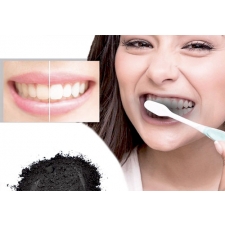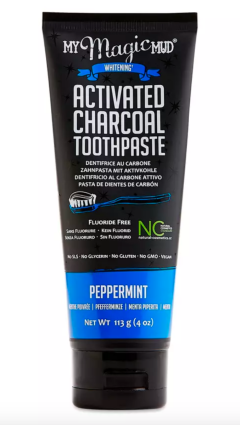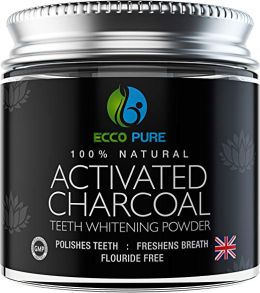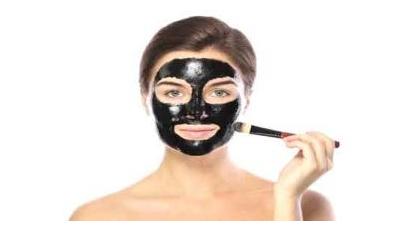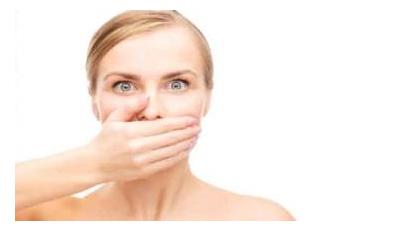Ancient peoples used charcoal to clean their teeth, and some rural cultures still brush with charcoal. Recently, charcoal has enjoyed a resurgence in popularity in the western world as a tooth whitener. However, evidence for its benefits is limited, and some dentists believe that scrubbing your teeth with charcoal may actually do more harm than good.

The Theory Behind Charcoal Teeth Whitening
People have used charcoal to clean their teeth for thousands of years. Ancient Romans would grind down substances like shells, limestone, and charcoal and use the gritty powder to rub tartar, plaque, and food buildup from their teeth. Some rural communities in countries such as Nigeria and Tanzania still use traditional tooth cleaning methods, such as chewing on medicinal sticks and brushing with charcoal.1,2 Recently, people interested in natural remedies have begun using charcoal powder as an alternative to conventional toothpaste, believing that it helps whiten teeth.
Charcoal is a highly porous substance, able to absorb a variety of molecules. Activated charcoal, heated to a high degree so that it has especially large, absorbent pores, is used to treat cases of poisoning and to filter water. Those who advocate for using charcoal to clean teeth suggest that the charcoal is similarly able to absorb bacteria and chemicals in your mouth, keeping them from staining your teeth. The grit can also physically scrape buildup off of your teeth.
Our Recommendation:Try My Magic Mud Activated Charcoal toothpastewith an RDA of 136.

Evidence of Whitening Efficacy is Very Limited
As brushing with charcoal is a relatively new fad, very little research has been done on its efficacy as a whitening agent. Some small-scale studies have been performed, with mixed results. Some indicate that charcoal-based toothpaste has no negative impacts on oral health or even reduces the risk of cavities, while others suggest that charcoal in toothpaste causes enamel wear and increased risk of cavities. Few so far have reported any whitening effects from charcoal toothpaste.3 The recent conclusion from a group of dental researchers is that charcoal can help with surface stains initially, but there are no long-term whitening benefits.4 In fact, regular use of charcoal may actually stain the teeth itself.4,5

Check That Your Charcoal Toothpaste is Not Too Abrasive
A major concern that dentists have about charcoal is its abrasive nature. Though good for scraping plaque and superficial stains from the surfaces of teeth, gritty substances like charcoal can actually wear away enamel when used for prolonged periods. Not only does this reduce your teeth’s protection from decay, it can also allow the charcoal itself to get embedded in the softer inner dentin. If you routinely brush with charcoal for a few months or longer, you can end up with gray or yellowish teeth.4,5
Some toothpastes that are made with a finer charcoal powder may be less harsh on your enamel. A piece of advice from dentists is to check the Relative Dentin Abrasively rating of a brand of toothpaste. A score of 250 or less is considered safe for your teeth.6
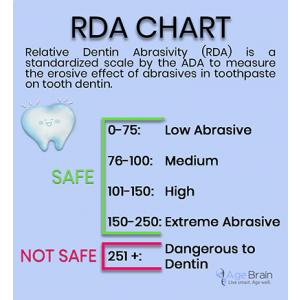

Advice for Brushing with Charcoal
If you do decide to try brushing your teeth with charcoal, do so carefully. Once you have finished brushing, rinse your mouth out thoroughly with clean water. Leaving charcoal in your mouth can turn your tongue gray or black. Also, be careful to swallow as little as possible. Charcoal is used to absorb toxins, but it also absorbs nutrients just as well. Ingesting charcoal can reduce the amount of nutrition you can digest from your food. It can also cause gastrointestinal upset, such as constipation, nausea, and diarrhea.7 Don’t use charcoal in lieu of fluoride toothpaste either: fluoride is essential for keeping your enamel strong and preventing cavities.
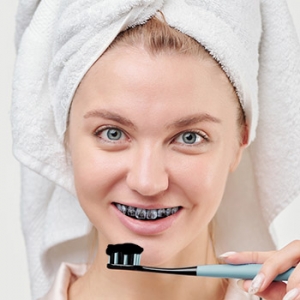
[1] Bukar M, Audu BM, Adesina OA, Marupa JY. 2012. “Oral health practices among pregnant women in North Eastern Nigeria.” Niger J Clin Pract. Jul-Sep; 15(3):302-305. https://www.ncbi.nlm.nih.gov/pubmed/22960965
[2] Masalu JR, Kikwilu EN, Kahabuka FK, Senkoro AR, Kida IA. 2009. “Oral health related behaviors among adult Tanzanians: a national pathfinder survey.” BMC Oral Health. Sep 14; 9:22. https://www.ncbi.nlm.nih.gov/pubmed/19751519
[3] Brooks JK, Bashirelahi N, Reynolds MA. 2017. “Charcoal and charcoal-based dentifrices: A literature review.” J Am Dent Assoc. Sep; 14(8):661-670. https://www.ncbi.nlm.nih.gov/pubmed/28599961
[4] “Black, white and shades of gray: Dental students’ research project shows in long run, charcoal toothpaste likely won’t help whiten teeth.” Creighton University News Center. April 26, 2018. http://www.creighton.edu/publicrelations/newscenter/news/2018/april2018/april262018/charcoalresultsnr042618/
[5] Singh RP, Sharma S, Logani A, Shah N, Singh S. 2016. “Comparative evaluation of tooth substance loss and its correlation with the abrasivity and chemical composition of different dentifrices.” Indian J Dent Res. Nov-Dec; 27(6):630-636. http://www.ijdr.in/article.asp?issn=0970-9290;year=2016;volume=27;issue=6;spage=630;epage=636;aulast=Singh
[6] American Dental Association. “Toothpastes.” Oral Health Topics. https://www.ada.org/en/member-center/oral-health-topics/toothpastes
[7] “Activated Charcoal.” 2016. WebMD. https://www.webmd.com/vitamins-and-supplements/activated-charcoal-uses-risks#1
-
Activated Charcoal Benefits
By Dr. AnnaDecember 20, 2021 -
Best Mouthwashes for Bad Breath
By Dr. AnnaDecember 20, 2021 -
Magic Mouthwash
By Dr. KarenDecember 26, 2021
Search the blog
Article Categories
- All Articles (95)
- Rating Charts (1)
- Beauty & Skincare (17)
- FAQ (0)
- Hair Care (9)
- Health & Wellness (12)
- Anti-Aging (4)
- Kid's Health (0)
- Makeup (2)
- Men's Health (2)
- Oral Care (3)
- Sunscreen (7)
- Skin Tools & Treatments (10)
- Supplements (26)
- Videos (0)

